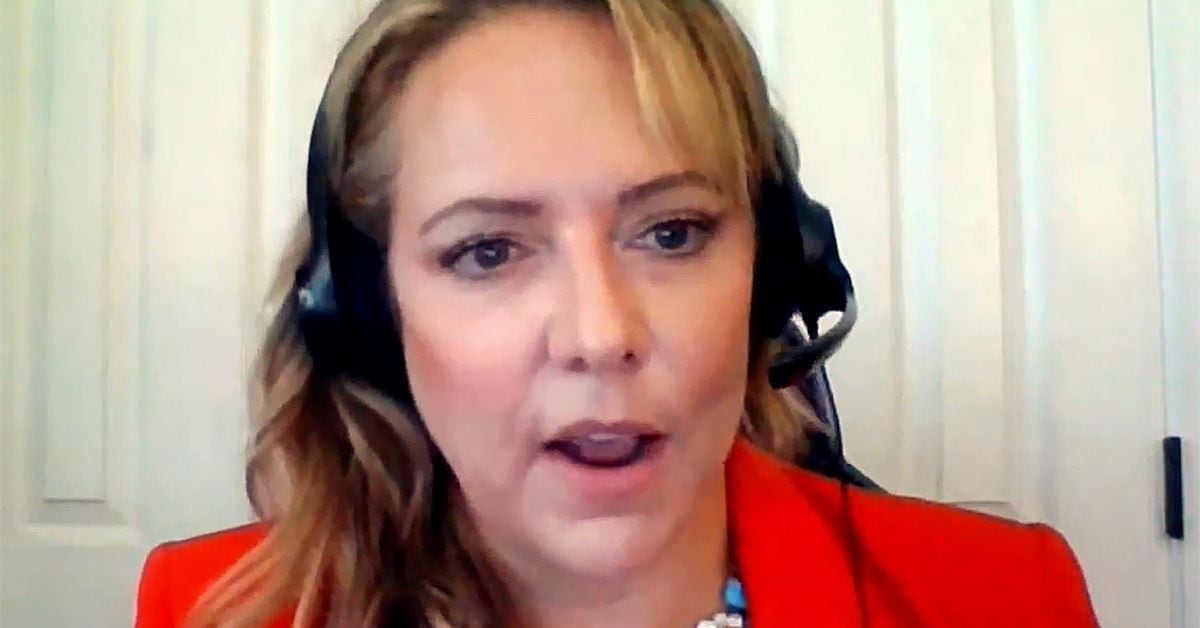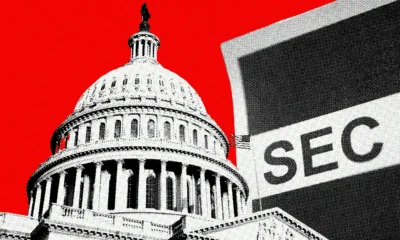Regulation
CFTC Commissioner Summer Mersinger on Overzealous Crypto Regulation and the Need for Legislative Action

Commissioner Summer Mersinger, of the Commodity Futures Trading Commission (CFTC), is one of the few U.S. regulators who is routinely willing to defend the crypto industry and call out what she sees as overzealous oversight. She will be speaking at Consensus 2024 in Austin, Texas, on May 30.
CoinDesk caught up with Mersinger to discuss the Cain and Abel rivalry between the CFTC and U.S. Securities and Exchange Commission (SEC), how her agency decides which enforcement actions to pursue and her views on a variety of issues, including the CME possibly getting into the spot bitcoin market, the emerging world of betting markets and Washington D.C. traffic.
Is it an accurate view that the SEC and the CFTC are in somewhat of a turf war over crypto?
I think there are certainly questions around who has the appropriate authority. There are people between the two agencies who are willing to work together, in fact, at Consensus Commissioner Peirce and I will be speaking together. We have some similar views. But it is a struggle because, sometimes where debate has been leveled – whether it’s an enforcement case or another action we have said falls under our fraud and manipulation enforcement authority – we’re seeing the SEC start to ask questions as though it falls under their jurisdiction. And so there is certainly some tension there. It’s largely the lack of clarity that’s really causing the tension.
You’re in a minority position as a regulator who’s somewhat favorable to crypto. Could you just explain why it is that you’re willing to stick your neck out?
Part of the reason I went into government, generally, is that – while there’s a need for government in people’s lives – we don’t want to overstep. We also want to make sure the rules of the road are clear so that people can abide by the law. This is an area where there is a real problem. A lot of people are very interested in investing in, or trading, cryptocurrencies, and we have not provided any clarity – we’ve made it very murky. That’s not what the government should be doing. It’s creating a situation where you have people relying on the word of a regulator, and the rules of the game are being changed in the middle of the play.
I still think it’s important that we speak up and let people know that, whether you like crypto or not, that’s not the point here. The point is that regulators have really made this confusing and difficult.
Do you agree with Commissioner Pham’s idea that the Government Accountability Office should investigate the CFTC’s enforcement actions?
COMMISSIONER MERSINGER: It’s difficult to ask another agency to come in and look at the internal workings of the CFTC. I understand where Commissioner Pham is coming from and I think it’s that same kind of feeling that we shouldn’t be regulating through enforcement. But I also think this is a leadership question. I greatly respect Chairman Behnam, but this is an issue with the political direction from this White House. So, instead of an audit, we need to ask: Is the problem the agency, or the current political leadership driving our agenda and broadly stifling financial innovation?
I don’t want to put words in your mouth, but is this to suggest that the regulatory landscape would improve if Trump was re-elected in November?
There are clear differences between President Biden and former President Trump, so that does drive the regulatory agenda. So, if leadership changes, you would certainly assume there would be new policies and a new regulatory agenda.
I’m curious to what extent you’re in active dialogue with Congressmembers about potential crypto legislation?
They use us as a resource. We talk to members of the House Financial Services Committee, the Agriculture Committee, and certainly members of the Senate and work with them on where there is ambiguity in the laws or opportunities to make some delineations and clear paths for regulation. It’s offering our assistance and expertise and it’s helpful to have those conversations because they also want to make sure we’re able to implement the laws that they pass. They may have great intentions, but if it’s impossible for the agency to implement then it’s useless.
That makes a lot of sense. Do you think that there needs to be bespoke crypto legislation or would new interpretations of existing laws suffice?
There are some who believe we can use current statutory authority, whether the SEC or the CFTC, to regulate – which is where we see regulation through enforcement actions. I disagree. The only way to get past just bringing enforcement actions is to have something come out of Congress that says “here’s how to handle cryptocurrencies.”
Beyond legislation, the two agencies also need to sit down and come up with some joint rulemaking. We did that with Dodd Frank, and we certainly could do that here. That’s an important piece of making sure people know which regulator is going to regulate them, which door to walk into. There’s no question that without statutory changes to ensure it’s very clear where the jurisdiction is, agencies will try to go in separate directions.
I know every enforcement action is primarily driven by facts on the ground. But I think it might be interesting to get a view into how these cases are built. What is the process of building a case against someone like Avi Eisenberg?
Without talking about any specific enforcement cases, with a lot of these cases it’s been whistleblower reports saying “I think somebody is violating the law.” It could be a victim who says they lost money, and I don’t think what they’re doing is legal. We have a pretty large team of enforcement investigators and attorneys who start building a case. By the time it gets to us at the commission, usually the facts have been pretty well established and how they line up with the law. We’re kind of like a jury that decides whether the facts meet our statutory requirements.
A lot of it is done by the enforcement team that might interview the whistleblower and other employees, get documents. A lot of time goes into each case before it gets to the commission for a vote. There’s also a lot of cooperation between the various agencies, whether it’s the DOJ, state regulators or the SEC. So where there’s opportunities to bring cases under multiple statutes, or different regulators, they’ll work together. It’s more efficient for the government if they can work together. They can also tip each other off. If we had to get every lead, I think it’d be really difficult.
Now one distinction I want to make is you hear a lot of numbers around crypto enforcement cases. I think it’s a little unfair because a lot of these cases are just run of the mill fraud; somebody stealing someone else’s money, someone claiming to buy crypto, but not actually buying the crypto. So we’ve seen this play out with whatever the hot topic is at the time. I’d say every few years the theme changes – it was foreign currencies, it was metals, we saw a lot of gold fraud. Right now crypto is the hot thing. A lot of cases have been portrayed as cryptocurrency fraud, but it’s just fraud with a crypto wrapper around it. So tomorrow, it might be AI fraud.
I almost hate to say it, but given how much fraud centers around crypto, do you think that there should be more enforcement actions?
I think when it’s straight up fraud, yes. There’s a distinction here when you have a case where somebody just takes your money and claims to invest in something and never does – there’s no question who has the authority there. The more we can try to shut some of this down, the better.
But where there’s a policy question around a certain activity and how our statute would fit with that activity, that’s where I get a little nervous. For instance, if we’re looking at a DeFi protocol, and we’re saying they’re violating our statute it can be difficult if we’ve never really said how our statute applies to DeFi.
We’re starting to set out definitions and interpretations based on court cases, because sometimes you’ll find use cases where there are bad actors. Sometimes it’s people who want to abide by the law, but there’s no clear way how they would do that. That’s why I think we’d be better off with rulemaking.
What do you make of the argument that the SEC implicitly said that Ethereum is a commodity when futures went live in 2021?
So this is an interesting question in development. We do have futures products trading on ether. And I do think if somebody decides that ether is a security, it calls into question what happens. We’ve [the CFTC] been regulating those contracts. They operated well, we have no concerns. This was an area where we thought there was clarity, and now we’re not quite sure if there’s clarity and that’s dangerous.
The law is a little strange; commodities can be a lot of other things – you can have a commodity that is a security. The nomenclature gets a little tricky the way the law is written. But we’ve said we believe this is a commodity and we’re going to regulate it as such under CFTC jurisdiction because it is a derivative product. To me that has been clearly laid out and we shouldn’t be introducing new kinds of questions around what has been a clear policy.
Given how interrelated these assets are, do you think the U.S. would be better off with a single unified agency, like the U.K.’s FCA?
I’m always hesitant to recommend any new government agencies or adding more government. History has shown that more government has never been the answer. But I do think sometimes you’ve got to better tailor statutes. Crypto doesn’t neatly fit into any of our financial categories, so we’re gonna have to fine tune some of the law. That’s what Congress does, so we can easily do this without any new agency.
Why is the CFTC so against betting markets?
It’s a very tough, difficult topic because there’s a lot of nuance. So these markets, which we call event contracts, are part of our statute that was added under the Dodd Frank Act. In the grand scheme of things, it’s relatively new, but we’ve seen interest in these contracts for quite some time and it’s certainly ramping up. The way Congress laid it out for us it said these contracts generally are OK, as long as they don’t touch on a number of topics, like gaming, war, terrorism, assassination – anything that’s against federal law. There are a number of people who really don’t like election contracts and would like to include them in this list.
Then there’s this public interest piece that tries to determine whether having this contract would be against the public interest. It’s not necessarily that we are against these markets, but there have to be some guardrails. Congress directed us to have some guardrails, and we’re trying to build them. You see that with our recent vote. My feeling is if that’s the route you want to take, you still have to do a public interest determination for every contract, which is why I dissented because we were limiting elections as a category.
At the end of the day, we want to create a framework where if you’re registered with us, you won’t have a legal question every time you try to do something new. We are just struggling a little bit with the approach. Congress tried to help us create clarity, but certainly left a lot of a lot left to the regulator to figure out.
The Financial Times reported today that CME is thinking about listing spot bitcoin trading, not not just bitcoin futures. Is that something that you are supportive of?
You know, the first time I heard about it was this morning as well, so I haven’t had those conversations. I want to talk a little bit more with CME and with our staff to find out what this means. There’s a lot of questions around custody and other issues. So right now, I don’t have a positive or negative opinion and honestly, as a regulator, I shouldn’t. They should be able to make those market decisions as long as they’re following the rules. We try to be a regulator that is principles based and let our registered entities run the markets, because that’s what they do. Our job is just to make sure everyone’s following the rules.
Quick round of overrated/underrated? You could decline to answer or clarify your position. DeFi?
I don’t have a position one way or the other. I just think as a regulator, we should have clear rules of the road for DeFi.
You know, I’m gonna say Washington D.C. is a little overrated. Mostly because I was just in the Midwest where there was no traffic. It was very pleasant.
Neutral. You know, I’ve never met him. So I try to withhold my opinions of people until I’ve had a chance to sit down and get to know them.
The phrase “sufficiently decentralized?”
You’re either decentralized or you’re not. So I think sufficiently decentralized feels a little overrated because I don’t know what that means. It probably means you’re not decentralized.
What are you most looking forward to at Consensus?
The conversations with so many different stakeholders. This is an opportunity to talk with people we ordinarily wouldn’t see in Washington, D.C. and to have them all in one place is really special.
Thank you again for the time. Nice to meet you both.
Regulation
Cryptocurrency Regulation in Slovenia 2024

Slovenia, a small but highly developed European country with a population of 2.1 million, boasts a rich industrial history that has contributed significantly to its robust economy. As the most economically developed Slavic nation, Slovenia has grown steadily since adopting the euro in 2007. Its openness to innovation has been a key factor in its success in the industrial sector, making it a favorite destination for cryptocurrency enthusiasts. Many believe that Slovenia is poised to become a powerful fintech hub in Europe. But does its current cryptocurrency regulatory framework support such aspirations?
Let’s explore Slovenia’s cryptocurrency regulations and see if they can push the country to the forefront of the cryptocurrency scene. My expectations are positive. What are yours? Before we answer, let’s dig deeper.
1. Cryptocurrency Regulation in Slovenia: An Overview
Slovenia is known for its pro-innovation stance, providing a supportive environment for emerging technologies such as blockchain and cryptocurrencies. Under the Payment Services and Systems Act, cryptocurrencies are classified as virtual assets rather than financial or monetary instruments.
Regulation of the cryptocurrency sector in Slovenia is decentralized. Different authorities manage different aspects of the ecosystem. For example, the Bank of Slovenia and the Securities Market Agency supervise cryptocurrency transactions to ensure compliance with financial laws, including anti-money laundering (AML) and counter-terrorist financing regulations. The Slovenian Act on the Prevention of Money Laundering and Terrorist Financing (ZPPDFT-2) incorporates the EU’s Fifth Anti-Money Laundering Directive (5MLD) and aligns with the latest FATF recommendations. All virtual currency service providers must register with the Office of the Republic of Slovenia.
2. Cryptocurrency regulation in Slovenia: what’s new?
This year, there have been several noteworthy developments in the cryptocurrency sector in Slovenia:
July 25, 2024: Slovenia has issued a €30 million on-chain sovereign digital bond, the first of its kind in the EU, with a yield of 3.65%, maturing on 25 November 2024.
May 14, 2024: NiceHash has announced the first Slovenian Bitcoin-focused conference, NiceHashX, scheduled for November 8-9 in Maribor.
3. Explanation of the legal framework for cryptocurrency taxation in Slovenia
Slovenia’s cryptocurrency tax framework provides clear guidelines for both individuals and businesses. According to the Slovenian Tax Administration, tax treatment depends on the status of the trader and the nature of the transaction.
- Individuals: Income earned from cryptocurrencies through employment or ongoing business activities is subject to personal income tax. However, capital gains from trading or market fluctuations are exempt from taxation.
- Society: Capital gains from cryptocurrency activities are subject to a corporate income tax of 19%. Value added tax (VAT) generally applies at a rate of 22%, although cryptocurrency transactions considered as means of payment are exempt from VAT. Companies are not allowed to limit payment methods to cryptocurrencies only. Tokens issued during ICOs must comply with standard accounting rules and the Corporate Tax Act.
4. Cryptocurrency Mining in Slovenia: What You Should Know
Cryptocurrency mining is not restricted in Slovenia, but the income from mining is considered business income and is therefore taxable. This includes rewards from validating transactions and any additional income from mining operations. Both natural persons and legal entities must comply with Slovenian tax regulations.
5. Timeline of the evolution of cryptocurrency regulations in Slovenia
Here is a timeline highlighting the evolution of cryptocurrency regulations in Slovenia:
- 2013:The Slovenian Tax Administration has issued guidelines according to which income from cryptocurrency transactions should be taxed.
- 2017:The Slovenian Tax Administration has provided more detailed guidelines on cryptocurrency taxation, based on factors such as the trader’s status and the type of transaction.
- 2023The EU has adopted the Markets in Cryptocurrencies Regulation (MiCA), which establishes a uniform regulatory framework for cryptocurrencies, their issuers and service providers across the EU.
Final note
Slovenia’s approach to the cryptocurrency industry is commendable, reflecting its optimistic view of the future of cryptocurrency. The country’s balanced regulatory framework supports cryptocurrency innovation while protecting user rights and preventing illegal activities. Recent developments demonstrate Slovenia’s commitment to continuously improving its regulatory environment. Slovenia’s cryptocurrency regulatory framework sets a positive example for other nations navigating the evolving cryptocurrency landscape.
Read also: Cryptocurrency Regulation in Hong Kong 2024
Regulation
A Blank Slate for Cryptocurrencies: Kamala Harris’ Regulatory Opportunity

Photo by The Dhage of Shubham ON Disinfect
As the cryptocurrency landscape continues to evolve, the need for clear regulation has never been greater.
Vice President Kamala Harris is now leading the charge on digital asset regulation in the United States, presenting a unique opportunity for a clean slate. This fresh start can foster innovation and protect consumers. It can also pave the way for widespread adoption across industries, including real estate agencies, healthcare providers, and online gambling platforms like these online casinos in the uk. According to experts at SafestCasinoSites, these platforms have advantages such as bonus offers, a wide selection of games, and various payment methods. Ultimately, all this increased adoption could push the cryptocurrency market forward.
With that in mind, let’s take a look at the current state of cryptocurrency regulation in the United States, which is a complex and confusing landscape. Multiple agencies, including the Securities and Exchange Commission (SEC), the Commodity Futures Trading Commission (CFTC), and the Financial Crimes Enforcement Network (FinCEN), have overlapping jurisdictions, creating a fragmented regulatory environment. This lack of clarity has hindered innovation, as companies are reluctant to invest in the United States, fearing regulatory repercussions. A cohesive and clear regulatory framework is urgently needed to unlock the full potential of cryptocurrencies in the United States.
While the US struggles to find its footing, other countries, such as Singapore and the UK, are actively embracing the cryptocurrency industry with clear and supportive regulatory frameworks. This has led to a brain drain, with companies opting to set up in more hospitable environments.
Vice President Kamala Harris has a unique opportunity to change this narrative and clean up the future. cryptocurrency regulation. By taking a comprehensive and inclusive approach, it can help create a framework that balances consumer protection with innovation and growth. The time has come for clear and effective regulation of cryptocurrencies in the United States.
Effective regulation of digital assets is essential to fostering a safe and innovative environment. Key principles guiding this regulation include clarity, innovation, global cooperation, consumer protection, and flexibility. Clear definitions and guidelines eliminate ambiguity, while encouraging experimentation and development to ensure progress. Collaboration with international partners establishes consistent standards, preventing regulatory arbitrage. Strong safeguards protect consumers from fraud and market abuse, and adaptability allows for evolution in response to emerging trends and technologies, striking a balance between innovation and protection.
The benefits of effective cryptocurrency regulation are many and far-reaching. By establishing clear guidelines, governments can attract investors and traditional users, spurring growth and adoption. This, in turn, can position countries like the United States as global leaders in financial technology and innovation. Strong protections will also increase consumer confidence in digital assets and related products, boosting economic activity.
A thriving cryptocurrency industry can significantly contribute to GDP and job creation, which has a positive impact on the overall economy. Furthermore, effective regulation has paved the way for the growth of many companies such as tech startups, online casinos, and pharmaceutical companies, proving that clear guidelines can unlock new opportunities without stifling innovation. This is a great example of how regulation can alleviate fears of regressive policies, even if Kamala Harris does not repeal the current progressive approach. By adopting effective regulation, governments can create fertile ground for the cryptocurrency industry to thrive, driving progress and prosperity.
Regulation
Think You Own Your Crypto? New UK Law Would Ensure It – DL News

- The UK Law Commission has developed a bill that will address a situation of legal uncertainty.
- The commission’s goal is to ensure that cryptocurrencies are legally treated as personal property.
UK law is not entirely clear whether cryptocurrencies can be considered personal property.
This is according to the UK Law Commission, which argues that while most investors assume that when they buy cryptocurrencies, they are “acquiring property rights in the same way as buying, say, a watch or a laptop.”
“As the law currently stands, this is not necessarily the case,” the respected legal body said in a new report on Tuesday.
The report was accompanied by a solution: a new bill to consolidate the legal status of digital assets as personal property.
This could be huge for the estimated 4.7 million Britons valued hold cryptocurrencies.
“This will allow the courts to determine a range of issues,” the report says.
If passed, the law would help clarify how cryptocurrencies are treated in cases of bankruptcy, estate planning or theft.
Flexible law
The commission is an independent body responsible for reviewing UK law. It began investigating whether English and Welsh property laws apply to digital assets in 2020.
Join the community to receive our latest stories and updates
At the time, then-Chancellor of the Exchequer Rishi Sunak expressed ambitions to transform the UK into a cryptocurrency hub as Britons invested more.
In 2023, the commission decided that, in most cases, the legislation of England and Wales is sufficiently flexible to regulate cryptocurrencies.
This means that any asset, from Bitcoin to non-fungible tokens and some types of digital contracts, can be considered personal property, without Parliament having to write extensive new laws.
There was one small area of uncertainty, however: it was unclear whether cryptocurrencies fell within the two categories of personal property recognised under UK law.
These two categories are made up of tangible assets (cars, laptops, bags) and intangible assets (contracts, stocks, and debt).
The bill that will now go to Parliament to be converted into law aims to remedy this situation.
Without that clarification, courts may try to lump cryptocurrencies together with intangible assets, said Adam Sanitt, head of litigation, knowledge, innovation and corporate support EMEA at law firm Norton Rose Fulbright. DL News in March.
This is problematic because intangible assets are creations of the legal system, while cryptocurrencies are not.
“How the law treats digital assets, what rights you have over them, how you own them, how you transfer them to other people—that treatment is different, because digital assets don’t exist by virtue of the legal system, but independently of it,” Sanitt said.
The money in your bank account, for example, is a legal creation. The government could pass a law to cancel it.
However, if the UK passed a law banning Bitcoin, Bitcoin would not cease to exist.
Sanitt said: “That’s why digital assets are so important: neither the government nor the legal system can take them away from you.”
Contact the author at joanna@dlnews.com.
Regulation
The Solution the Cryptocurrency Industry Needs

The cryptocurrency industry has performed remarkably well since its inception, but now faces a critical hurdle that requires careful consideration and regulatory expertise to overcome. Despite the industry’s rapid growth and rate of global adoption, the gap between the industry and global regulation is only widening as new innovations break through into the public domain.
Although efforts are being made on both sides, regulators’ lack of familiarity with cryptocurrencies and the industry’s lack of regulatory expertise are hindering innovation in the sector. To address this issue, traditional financial institutions (TradFi) such as MultiBank Group have started venturing into the cryptocurrency sector.
The regulatory gap
Over the past decade, the cryptocurrency industry has grown dramatically as tech entrepreneurs and forward-thinking thinkers have founded a plethora of crypto platforms and protocols to push the boundaries of the space. The problem faced by these newcomers, who are often unfamiliar with the hurdles posed by financial regulators, can quickly overwhelm and stall operations.
On the other hand, regulators more attuned to TradFi systems may be equally stifled by the complexities of decentralization and blockchain technology. The unfamiliarity experienced by both innovators and regulators creates a stark regulatory divide between both sides, leading to misunderstandings and potential conflicts.
To overcome this lack of communication, a bridge must be built to bridge the gap, ensuring future stability for the cryptocurrency industry and clearer legislation from regulators.
Efforts to bridge the gap between industry
The gap between the cryptocurrency industry and regulators is slowly narrowing as efforts to regulate cryptocurrencies and Web3 space activities are gaining momentum. Specific regulatory actions are taking place in many countries, aimed at providing greater oversight of cryptocurrency transactions, cryptocurrency exchanges, and initial coin offerings (ICOs).
Despite being a positive step in the right direction, these new regulations can differ significantly between jurisdictions around the world. This fragmentation results in a regulatory environment filled with obstacles, bottlenecks, and varying requirements and prohibitions. As cryptocurrency companies and TradFi institutions attempt to navigate the minefield, the regulatory maze becomes increasingly convoluted.
TradFi institutions like MultiBank Group are working to solve this problem, as one of the largest financial derivatives institutions in the world with over 12 licenses across all continents. Founded in 2005, the Group has an impeccable and trustworthy reputation globally, extensive expertise in financial regulation and has now ventured into the cryptocurrency space via MultiBank.io.
MultiBank.io: TradFi Excellence in the Crypto Space
Expanding into the cryptocurrency space via MultiBank.io has enabled MultiBank Group to provide regulatory clarity and trust to the digital asset industry. With a substantial daily trading volume of $12.1 billion, the timely decision to enter the cryptocurrency space has the potential to set regulatory precedents and standards for years to come.
By helping to develop sensible and well-considered regulations, MultiBank.io’s established reputation allows the company to communicate effectively and clearly with regulators. Unlike others in the industry without regulatory expertise, MultiBank.io facilitates the Group’s commitment to rigorous regulatory standards, the scope of oversight and establishes the necessary transparency.
The company’s approach ensures that regulatory licenses are pre-acquired, compliance is met globally without jurisdictional barriers, and transactions remain secure at all times. By helping to create robust regulations that are both clear and innovation-friendly, MultiBank Group looks forward to standardizing the entire cryptocurrency industry for other potential innovators.
One of the biggest challenges in establishing a clearly constructed bridge between regulators and the cryptocurrency industry is effective communication. By leveraging its institutional background TradFi and acting as an intermediary with regulators, MultiBank Group is able to translate the needs of the industry to those who shape it.
This quality of mediation is essential to ensure that regulation helps develop essential technological advances rather than hinders their establishment and growth. Through the lens of TradFi when looking at the complexity of the cryptocurrency industry, MultiBank Group is able to deconstruct unfamiliar crypto arguments for regulation and create a safer and more secure space.
Where TradFi and Crypto Meet
Regulations are crucial for traders, investors, and everyday users of crypto platforms and their safety when participating in crypto markets. While strict regulations are necessary for stable market integrity, innovation should still be considered, something MultiBank Group considers a priority.
Where TradFi and cryptocurrencies converge, the Group is there to provide a balanced approach to ensure promotion for both the cryptocurrency industry and regulators seeking to protect both retail and institutional investors. This balance is critical to maintaining a thriving space where cryptocurrency innovation can thrive without compromising the security of user funds or data.
As more TradFi institutions like MultiBank Group enter the cryptocurrency space with ever-expanding expertise in regulatory understanding, the future of the industry is increasingly encouraged. The financial freedoms of the cryptocurrency space coupled with regulatory oversight for financial security will be the guiding lights for the future success of the entire cryptocurrency industry.
No spam, no lies, just insights. You can unsubscribe at any time.
-

 Ethereum12 months ago
Ethereum12 months agoEthereum Posts First Consecutive Monthly Losses Since August 2023 on New ETFs
-

 Regulation12 months ago
Regulation12 months agoCryptocurrency Regulation in Slovenia 2024
-

 News12 months ago
News12 months agoNew bill pushes Department of Veterans Affairs to examine how blockchain can improve its work
-

 Regulation12 months ago
Regulation12 months agoThink You Own Your Crypto? New UK Law Would Ensure It – DL News
-

 Regulation12 months ago
Regulation12 months agoUpbit, Coinone, Bithumb Face New Fees Under South Korea’s Cryptocurrency Law
-

 Regulation12 months ago
Regulation12 months agoA Blank Slate for Cryptocurrencies: Kamala Harris’ Regulatory Opportunity
-

 Regulation12 months ago
Regulation12 months agoBahamas Passes Cryptocurrency Bill Designed to Prevent FTX, Terra Disasters
-

 Regulation12 months ago
Regulation12 months agoIndia to Follow G20 Policy for Cryptocurrency Regulation: MoS Finance
-

 News1 year ago
News1 year ago“Captain Tsubasa – RIVALS” launches on Oasys Blockchain
-

 Ethereum1 year ago
Ethereum1 year agoComment deux frères auraient dérobé 25 millions de dollars lors d’un braquage d’Ethereum de 12 secondes • The Register
-

 News12 months ago
News12 months agoEU supports 15 startups to fight online disinformation with blockchain
-

 News1 year ago
News1 year agoSolana ranks the fastest blockchain in the world, surpassing Ethereum, Polygon ⋆ ZyCrypto

















